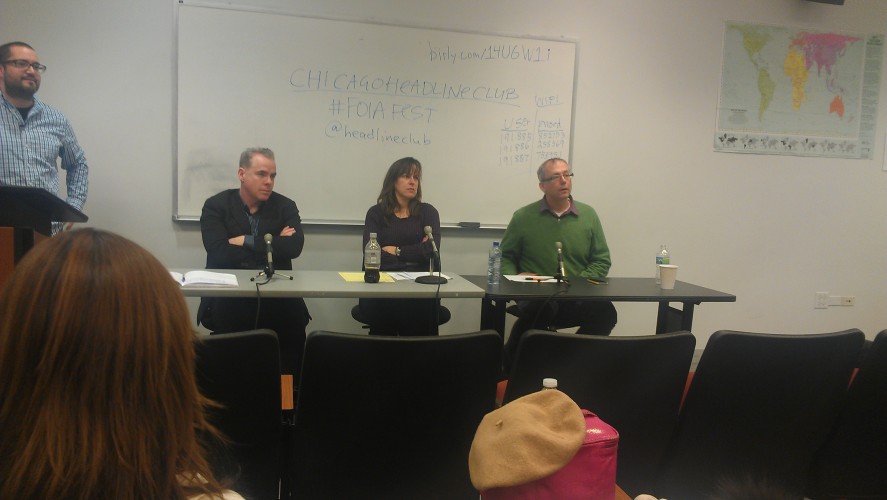The Chicago Headline Club association held it’s first “FOIAFEST” event on March 12, 2013 at Columbia College 33 E. Congress Ave. in the Journalism Department. The Club is known for providing the city’s communities, journalists, and activists with information and programs like the one on data and assistance on how to access public government information.
The Freedom of Information Act [FOIA] gives citizens the right to access information from the federal government. This law is often known as “the law that keeps citizens in the know about their government.”

The event included a panel with Dan O’Neil , Citizen Advocacy Center’s Terry Pastika, and Joe Germuska from Northwestern University Knight Lab, moderated by recent Terkel Award winner Fernando Diaz, and panelists addressed issues revolving around public data dilemmas and how today’s technological advances will influence access to data.
Daniel O’Neil, who is the Executive Director of Smart Chicago Collaborative, ran business development for the recently shuttered “Everyblock Chicago.” It was an online web scraping site that included access to articles, crimes, and neighborhoods
O’Neil sparked laughter with his comment. “Let me just start off by saying this …I’m not a real journalist or trained I messed around with Everyblock.The reality is that I work to get people to understand data.” Yet on the serious side, his work with Everyblock was part of an online journalism boom.

“In 2009 the FOIA law was changed the law offices wasn’t keeping up with public data requests,” explained Joe Germuska . He referred to himself as a ” Tech Nerd” but he along with O’neil work together he says to ” to help change today’s culture of how public bodies gain access to public data.”
He wants people who are looking for governmental files on issues within their communities to know all that there are tools and strategies people can use in order to get documents in the most usable format.
“It’s just good to learn the language ,” said Germuska .
But Terry Patskia, Executive Director and Community Lawyer at the Community Advocacy Center says that part of the problem people have with receiving data is that they ” take for granted that it’s mostly correct.”
” The mission is to build democracy and community organizing . We have to educate people on the 1st Amendment right , we have to say to the Legislators these laws are not working and here’s why ,” explained Pastiska.
O’neil says that although he isn’t an expert at the FOIA law he does know that that there were changes implemented into the laws and that it the changes does “not add value because anybody can hide the ball.

Currently, FOIA data requests outpace the ability of agencies to comply. A million requests for government data have received replies, but 71,800 citizens have cases remaining on the backlog and their requests are still pending.
Individuals at the panel raised questions about their unanswered requests but their presence at the panel backed up what Joe Germuska talked about.
“The public is becoming much more savvy on data techonology and can call b.s. on government data quickly,”said Germuska . He explained that quite often the governmental data received is in certain formats some citizens can understand what the format while others can not.
The concern some have with FOIA data is that problems aren’t resolved even when the information is out and public.
“They [Federal Government ] work for us but we have a long way to go before we get an open government,” said Pastiska .
The FOIA FEST concluded March 13th inside of Navy Pier ‘s community room where more tips and strategies were offered to the public. For more information and help visit www.chicagoheadlineclub.org








Be First to Comment